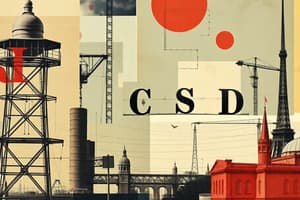Podcast
Questions and Answers
What does management primarily focus on?
What does management primarily focus on?
- Implementing rules and regulations
- Drawing a line from current to desired states (correct)
- Maximizing profit at all costs
- Maintaining existing systems
Which of the following is NOT considered an element of management?
Which of the following is NOT considered an element of management?
- Evaluation
- Networking (correct)
- Planning
- Innovation
Which aspect of management involves setting future directions and specifics?
Which aspect of management involves setting future directions and specifics?
- Organizing
- Controlling
- Planning (correct)
- Leading
What is essential for effective management communication?
What is essential for effective management communication?
Which element highlights the importance of measuring success and progress in management?
Which element highlights the importance of measuring success and progress in management?
What is a key component in decision-making according to management principles?
What is a key component in decision-making according to management principles?
Which management function is about securing necessary resources?
Which management function is about securing necessary resources?
What process is referred to when adapting plans to changing situations?
What process is referred to when adapting plans to changing situations?
What is the primary focus of top management?
What is the primary focus of top management?
Which level of management requires more technical and personnel skills?
Which level of management requires more technical and personnel skills?
What is expected of middle management regarding continuous improvement?
What is expected of middle management regarding continuous improvement?
Which of the following roles is NOT associated with managers according to Mintzberg?
Which of the following roles is NOT associated with managers according to Mintzberg?
What type of management includes positions such as supervisor and foreman?
What type of management includes positions such as supervisor and foreman?
Which objective is NOT typically associated with organizations?
Which objective is NOT typically associated with organizations?
What is the symbolic role of a top manager referred to as in Mintzberg's framework?
What is the symbolic role of a top manager referred to as in Mintzberg's framework?
Which level of management is more involved in directing than planning?
Which level of management is more involved in directing than planning?
What principle does the modern science of management often follow?
What principle does the modern science of management often follow?
Who criticized the measurement principle in management as being outdated?
Who criticized the measurement principle in management as being outdated?
What factor influenced Sony’s Walkman success despite negative market research?
What factor influenced Sony’s Walkman success despite negative market research?
How does John Harvey-Jones view management problems?
How does John Harvey-Jones view management problems?
What aspect of management makes it unpredictable, according to the content?
What aspect of management makes it unpredictable, according to the content?
What is the primary responsibility of a manager in the role of Leader?
What is the primary responsibility of a manager in the role of Leader?
Which role involves seeking a variety of information to enhance understanding of the organization?
Which role involves seeking a variety of information to enhance understanding of the organization?
What is the function of the Disseminator role in management?
What is the function of the Disseminator role in management?
In the role of Disturbance Handler, what is a manager responsible for?
In the role of Disturbance Handler, what is a manager responsible for?
What does the Resource Allocator role entail?
What does the Resource Allocator role entail?
Which role is focused on promoting knowledge sharing among team members?
Which role is focused on promoting knowledge sharing among team members?
What does the role of Spokesperson involve?
What does the role of Spokesperson involve?
What action is taken by a manager acting as an Entrepreneur?
What action is taken by a manager acting as an Entrepreneur?
What is the primary role of a manager in the context of knowledge management?
What is the primary role of a manager in the context of knowledge management?
Which of the following best describes the manager’s role in continuous improvement?
Which of the following best describes the manager’s role in continuous improvement?
What differentiates re-engineering from continuous improvement and benchmarking?
What differentiates re-engineering from continuous improvement and benchmarking?
How do managers need to respond to evolving customer demands?
How do managers need to respond to evolving customer demands?
What is a key component of the manager’s role in benchmarking?
What is a key component of the manager’s role in benchmarking?
What is an essential quality managers must exhibit to meet customer demands?
What is an essential quality managers must exhibit to meet customer demands?
Which of the following describes the risks associated with re-engineering compared to other change processes?
Which of the following describes the risks associated with re-engineering compared to other change processes?
What is a primary challenge that managers face while leading teams?
What is a primary challenge that managers face while leading teams?
Flashcards are hidden until you start studying
Study Notes
Introduction to Management
- Management is defined as connecting one's current state to desired goals efficiently, involving human and material resources.
- Urwick describes management as directing human activities, encompassing both art and science in decision-making.
Elements of Management
- Horizon: A defined operational boundary within which management functions.
- Organization: Provides the structure necessary for management tasks.
- Planning, implementation, and monitoring are universally essential for all management activities.
- Staffing is crucial to ensure resources are available for management efforts.
- Leadership and direction are fundamental components of effective management.
- Communication is vital, acting as the lifeblood of the management process.
- Coordination ensures all activities align toward achieving objectives.
- Constant evaluation and control are necessary for progress and compliance.
- Innovation plays a significant role in achieving competitive success.
Planning in Management
- Involves making decisions about what, when, why, how, and who regarding organizational actions.
- Self-appraisal helps determine current positions and formulate improvements.
- Environmental study assesses external factors affecting the organization.
- Goal specification outlines objectives and methods for achievements.
- Policies, standards, and anticipated actions must be established.
- Planning includes forecasting future needs and adjusting plans based on changing situations.
Types of Management
- Top Management: Composed of high-level officials like Chairman and Presidents; focuses on strategic planning.
- Middle Management: Consists of department heads and general managers; facilitates communication between top and lower management.
- Lower Management: Involves supervisors and operational personnel; emphasizes directing activities and ensuring task completion.
Roles of Managers
-
Interpersonal Roles:
- Figurehead: Represents the organization in symbolic actions.
- Leader: Motivates and develops subordinates.
- Liaison: Maintains relationships outside the organization for information and support.
-
Informational Roles:
- Monitor: Gathers information to understand organizational dynamics.
- Disseminator: Shares relevant information, ensuring clarity and integration among team members.
- Spokesperson: Represents the organization’s interests and communicates policies externally.
-
Decisional Roles:
- Entrepreneur: Seeks improvement opportunities and initiates change.
- Disturbance Handler: Manages crises and unforeseen issues.
- Resource Allocator: Distributes resources effectively within the organization.
- Negotiator: Represents the organization in negotiations.
Knowledge Leadership Role
- Knowledge Team Builder: Constructs teams with specialized knowledge through ongoing education and technology.
- Knowledge Management: Sustains and shares expertise among team members to preserve organizational knowledge.
Change Handling Role
- Continuous Improvement Supporter: Advocates for marginal improvements and develops a quality culture.
- Benchmarking Leader: Identifies best practices and strives to close gaps between current performance and world-class standards.
- Re-engineering Leader: Oversees significant organizational redesigns, requiring careful planning and resource management due to inherent risks.
Management Challenges
- Managers must balance maintaining existing processes while inspiring teams to adapt to changes driven by customer demands.
- Flexibility and creativity are essential for responding effectively to evolving market needs.
- Measurement and data accuracy are crucial, yet intuition can sometimes guide decisions successfully.
Evolution of Management Science
- Modern management emphasizes measurable results, though intuitive decision-making remains relevant.
- Management adapts to changing styles and environments, drawing from other social sciences, resulting in unpredictability in practices and outcomes.
Studying That Suits You
Use AI to generate personalized quizzes and flashcards to suit your learning preferences.




